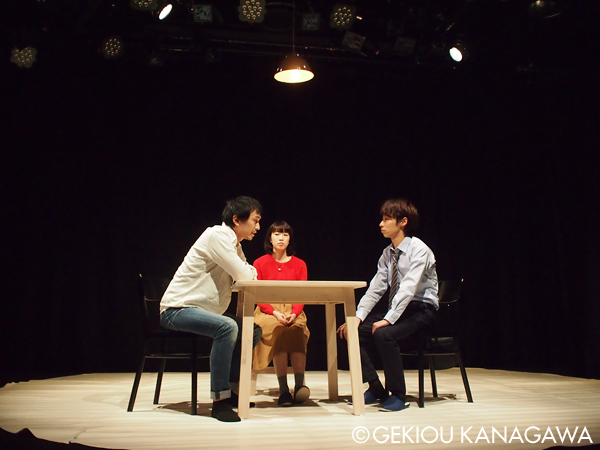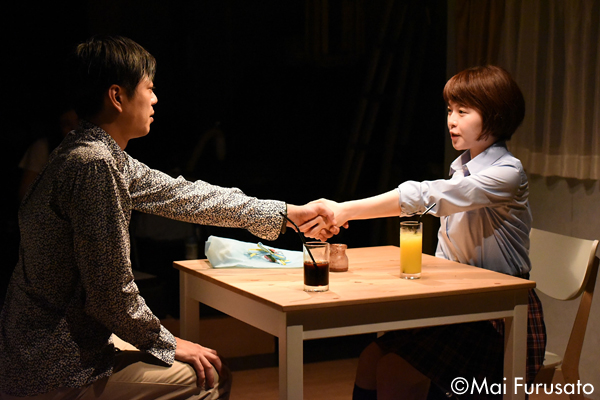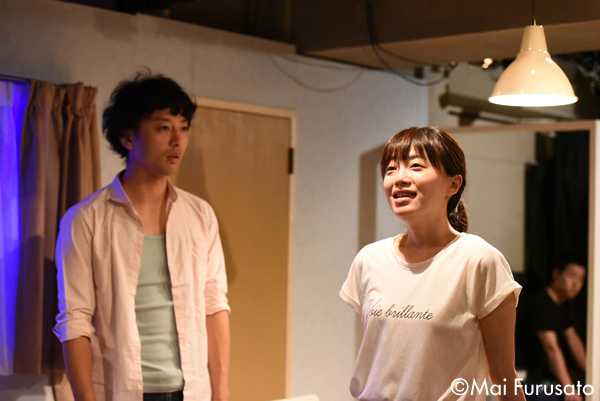The first act is titled “
Mado
” (Window). The scene is a room in an apartment building with the sound of many cars passing by on the street below. It is the room of Naoto, a man who works at a realty agent office. Naoto returns to find a troubling scene in which his elder brother Toshio is watching his lover Nami out on the veranda to make sure she doesn’t try to jump and take her life.
Toshio was working at a major corporation but the stress proved too much for him and he quit his job. After that, jobless and with nowhere to go, ended up at his younger brother’s apartment. Disheartened and exhausted by this situation, Toshio’s lover, Nami, has said she wants to break up, but Toshio won’t concede. Meanwhile, the younger brother Naoto, who had always been in the shadow of his over-achieving brother, is now rather pleased by this turn of the tables, and he also thinks fondly of Nami, which is why he has allowed his brother to stay at his apartment.
The three talk while drinking beer. The talk of Nami and Toshio breaking up soon drifts to the subject of a new real estate development project Naoto’s company is undertaking and the increasing volume of traffic on the street in front of the apartment. Nami suddenly proposes that the three of them find a place to live together. Toshio, with his low tolerance for alcohol is soon rather drunk, and when Nami leaves the room for a moment, he irresponsibly suggests to Naoto that he should start a relationship with Nami.
Naoto confesses to Nami that he has made a false invoice to meet his sales quota at the company. Nami, in turn, confesses about having shoplifted when she was a child. She had done it, she says, to win attention from her parents, who she were giving all their love to her younger sister. After seeing her family cry because of her act, however, she says that she became so sensitive to others’ pain that she couldn’t recognize her own pain anymore.
Looking out the window, the two see what they recognize to be Toshio smoking a cigarette in the apartment building across the street. Nami takes this as a certain sign that Toshio has agreed to break up with her and leaves the apartment. Soon Toshio returns. The two brothers begin drinking beer again to console themselves as they admit that in the end Nami won’t accept either of them.
Outside there is the sound of sharp braking and then a collision. Still, the endless drone of cars going by doesn’t cease.
The second act is “
Chantoshita Yugure
” (A Proper Evening). The scene is a private room at a Japanese style restaurant, where we find a middle-aged man in a suit named Ohnishi and an apparently high school-age girl named Azusa (Nami’s younger sister). It seems that the two are in a sex-for-money relationship of consent. It appears that Ohnishi is officially divorced and he presses Azusa to begin a proper relationship with him now.
The moment Ohnishi realized that he is in his prime years with a successful career and rewarding life he suddenly found himself feeling unbearably lonely, but was unable to share it with his wife. He says his wife went out one day, saying that she was going to buy some eggs she had forgotten to get, and she never returned. A month later he had sent divorce papers to her, and before long he found out that the papers had been filed and the divorce was official.
Azusa says she is willing to break up with her present boyfriend and begin a proper relationship with Ohnishi, but she goes on reasoning and concludes that in order to maintain her current standing and relationships with her friends and people around her, and if Ohnishi respects her worth, he should continue to pay her for meeting with him. She succeeds in convincing him by including hints that they might eventually get married.
Hesitantly, Ohnishi gives her some money as usual. But as she is about to leave, Ohnishi suddenly makes a call to his ex-wife in front of Azusa. As soon as Ohnishi starts to speak, the phone is hung up on the other end. As this happens, we hear the growing sound of traffic out on the street.
Act three is titled
Tenkiyoho wo Minai-ha
(One who doesn’t watch weather reports). The scene is a room of an old apartment where Ohnishi’s ex-wife Kinoshita lives. In the guise of a class reunion, she has summoned her former lover from her college days, Yusuke. Her cell phone rings, but as soon as she answers it she cuts the line and turn the phone off.
To Yusuke, who is somewhat distrustful of her motive in suddenly asking to meet, Kinoshita says that her husband went out shopping one day and never came back, and that now they are divorced. Kinoshita proposes that they avoid the boredom and loneliness of living alone by living together, though it need not be a love relationship.
After stopping to buy a few things while out on a walk, Kinoshita suggests that she could make a rice omelet like the ones they used to eat often in their student days, but she has forgotten to buy eggs.
Since separating from Ohnishi, Kinoshita has been living simply, while working part-time at a nearby supermarket. By now she is beginning to be forced to move out of this apartment she is living in. Amidst their trivial conversation, Yusuke has begun to feel a bit of haughty kindness toward her, but as if she has detected this, Kinoshita says, “You don’t need to feel that we should get back together.”
Suddenly there is a power failure and the lights go out. Yusuke has now begun to show a bit of anger at this woman who once left him and now seems to be playing with his emotions again. The lights come back on, and Yusuke says he will go buy the eggs Kinoshita forgot to get, and she asks to make sure he will return.
As she sees him out, Kinoshita’s cell phone rings again, but with this the stage goes dark except for the light of her phone’s screen. Outside is the roar of traffic coming and going.





